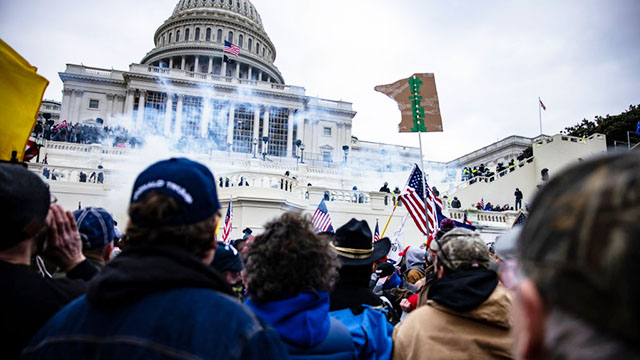It was a frightening scene of aggression and violence. On January 6, scores of pro-Trump demonstrators forced their way into the U.S. Capitol, overwhelming police and disrupting the joint session of Congress that had been called to ratify presidential election results.
How did this happen? Has it ever happened before? Northwestern experts break down the events of the day from many angles, shedding light on what was a dark day in American history.
How we got here
Erik Nisbet, School of Communication, is an expert on political misinformation.
“There was a great deal of worry about the possibility of partisan violence immediately around the Nov. 3 election, but when no major violent protests or events occurred, many breathed a sigh of relief.
“Likewise, many feared prior to the election that misinformation about the candidates would influence voters and taint the results. Neither materialized but the danger did not pass.
“What we have seen since Biden was declared winner of the 2020 presidential election is a deluge a misinformation about a supposed stolen election that has increased tolerance for violence among his supporters that has culminated in today’s sacking of the capitol building.”
Race meets politics
Alvin Tillery, Weinberg College of Arts and Sciences, is an expert on social movements and protests.
“It’s unbelievable. The double standards that ... the media and many of our citizens have been talking about since this summer.
“Between the ways that the COVID-19 protestors, with their long guns, were treated in places like Wisconsin and Michigan and the ways that Black Lives Matters protestors were treated — 95% of the Black Lives Matter protests had no property damage. They were peaceful, and you had the National Guard there waiting for them. So this is that double standard that people have been talking about all year on display.
“Apparently, the only thing you need to do to breach the U.S. Capitol is be an angry white man with a MAGA hat and a Trump flag, and go right in.”
Distance from those with different ideas
David Rapp, Weinberg College of Arts and Sciences and School of Education and Social Policy, is an expert on misinformation and political beliefs.
“In order to change their beliefs, they have to have a skeptical eye towards the ideas that they’re considering.
“They have to want to engage and think about evidence that counters what they already believe. They have to want to look at different sources other than the one or two media sources that they might rely upon or the one or two people that they listen to, President Trump being one of them, and they have to go outside of their circle.
“I suspect they distance themselves from people with different ideas. So it is going to be a real challenge to convince these people otherwise.”
Lesson to be learned
Olga Kamenchuk, School of Communication and the Institute for Policy Research, is an expert in opinion polling, Russian-American relations and security.
“What we see happening in D.C. and the Capitol reminds us of the coups from the authoritarian and the post-authoritarian world — attempted and successful ones. U.S. democracy, though, is older, its institutions are more stable, and its media is free. It will be much harder to succeed in an attempt of a coups.
“Yet, society should learn the lesson — what happens when democracy is being undermined and its institutions are being attacked, what happens when hate is being seeded, spread and voted for.”
America’s standing in the world
Ian Kelly is the former U.S. Ambassador to Georgia and currently ambassador (ret.) in residence at Northwestern.
“The violent attempt Jan. 6 to subvert the will of people was an experience that was all too familiar to me from my service as a diplomat overseas.
“Our standing in the global democratic community has been deeply damaged by the events. A hallmark of democracy is the peaceful transfer of power.
“We can restore much of that standing if we allow that to happen Jan. 20 and bring those who tried to thwart that process to justice.”
Yes, we’ve seen this before — in 1860
Michael Allen, Weinberg College of Arts and Sciences, is an expert on U.S. political history.
“Clearly, it’s a unique event, but there are patterns that are replaying. The most noteworthy is this unwillingness to acknowledge the clear outcome of an election because you don’t like the results.
“Many people don’t recall that’s what most directly lead to the Civil War. Of course, there were deeper causes that were simmering for years or even decades, as there are in this one. But that being said, what tipped the nation over into Civil War was the rejection of a clear electoral victory at the polls by Abraham Lincoln by a number of southern states and southern legislators simply because they didn’t like the outcome.
“That sort of rejection of the democratic will is very dangerous in a constitutional democracy.”
A way to end this
Monica Prasad, Weinberg College of Arts and Sciences and Institute for Policy Research, is an expert in political, economic and comparative historical sociology.
“It’s important to keep pointing out there is a way for Republicans to end this. If Trump is allowed to leave the presidency unimpeached, he will surely attempt to run again in 2024, continuing to kill the Republican party. But if Congress impeaches and convicts him, they also have the right to prevent him from running for office again.”

